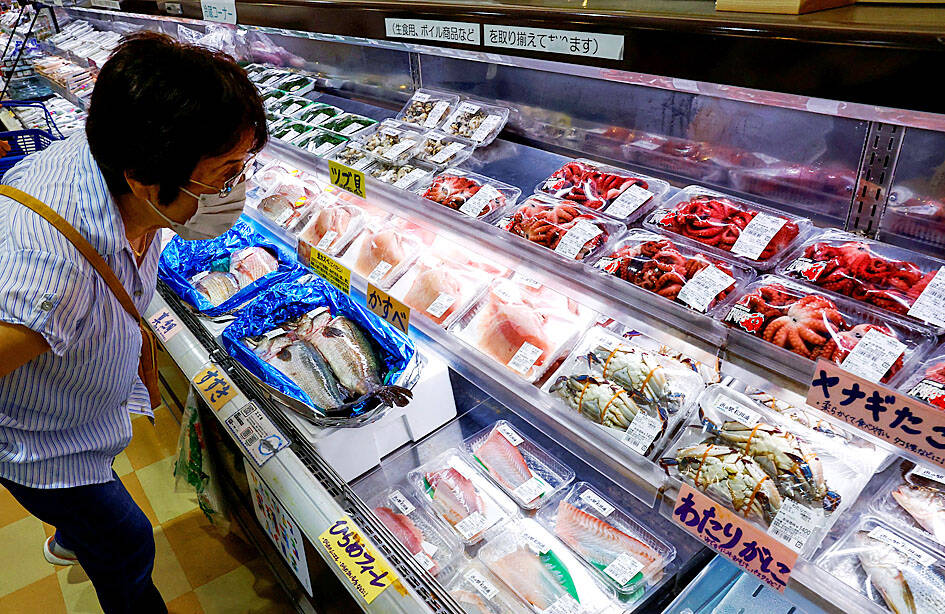The Food and Drug Administration (FDA) yesterday announced that it plans to remove the special restrictions on food imports from five Japanese prefectures, including Fukushima, and that the restrictions might be lifted by the end of the year after a 60-day public comment period ends.
Taiwan has banned all imports of Japanese food and agricultural products from five prefectures — Fukushima, Gunma, Chiba, Ibaraki and Tochigi — near the crippled Fukushima Dai-ichi nuclear power plant since 2011.
While the ban was partially lifted in 2022 and last year, some high-risk food products remained banned, and two certificates — a certificate of origin and a radiation inspection certificate — are required for food products imported from the areas. They are also subject to batch-by-batch inspections upon arrival.

Photo: Reuters
If the policy is implemented after the 60-day public comment period, food imports from the areas would be inspected according to normal border inspection and food safety risk management standards.
FDA Director-General Chiang Chih-kang (姜至剛) said 21,717 batches of food imports from the five Japanese prefectures were tested for radiation between Feb. 21, 2022, and Sept. 25 last year, and a total of more than 263,000 batches were tested in the past 14 years, but none failed the test, either according to Taiwanese or Japanese standards, so the risk is deemed “negligible.”
There were 53 nations or areas that imposed restrictions on food imports from Japan after the nuclear disaster, but 49 of them have totally removed the restrictions, he said, adding that only China (including Hong Kong and Macau), South Korea, Russia and Taiwan still have total or partial restrictions.
Asked about the matter at a separate setting, Minister of Health and Welfare Shih Chung-liang (石崇良) said that since the nuclear disaster in 2011, more than 260,000 batches of food imports from the area have been tested and most nations have now recognized the risk is negligible, so it is time to return to normal regulations based on scientific evidence.
Japan is the most popular destination among Taiwanese, with more than 6 million visits last year, and most Taiwanese are familiar with Japanese food, with many enjoying local food and having a great time in Japan, Chiang said.
If the current restriction is removed after the 60-day comment period, food importers would no longer be required to submit the two certificates, nor be subject to batch-by-batch inspection, he said.
Instead they would be subject to random border inspections and domestic market inspections like other food imports, he added.

Right-wing political scientist Laura Fernandez on Sunday won Costa Rica’s presidential election by a landslide, after promising to crack down on rising violence linked to the cocaine trade. Fernandez’s nearest rival, economist Alvaro Ramos, conceded defeat as results showed the ruling party far exceeding the threshold of 40 percent needed to avoid a runoff. With 94 percent of polling stations counted, the political heir of outgoing Costa Rican President Rodrigo Chaves had captured 48.3 percent of the vote compared with Ramos’ 33.4 percent, the Supreme Electoral Tribunal said. As soon as the first results were announced, members of Fernandez’s Sovereign People’s Party

MORE RESPONSIBILITY: Draftees would be expected to fight alongside professional soldiers, likely requiring the transformation of some training brigades into combat units The armed forces are to start incorporating new conscripts into combined arms brigades this year to enhance combat readiness, the Executive Yuan’s latest policy report said. The new policy would affect Taiwanese men entering the military for their compulsory service, which was extended to one year under reforms by then-president Tsai Ing-wen (蔡英文) in 2022. The conscripts would be trained to operate machine guns, uncrewed aerial vehicles, anti-tank guided missile launchers and Stinger air defense systems, the report said, adding that the basic training would be lengthened to eight weeks. After basic training, conscripts would be sorted into infantry battalions that would take

GROWING AMBITIONS: The scale and tempo of the operations show that the Strait has become the core theater for China to expand its security interests, the report said Chinese military aircraft incursions around Taiwan have surged nearly 15-fold over the past five years, according to a report released yesterday by the Democratic Progressive Party’s (DPP) Department of China Affairs. Sorties in the Taiwan Strait were previously irregular, totaling 380 in 2020, but have since evolved into routine operations, the report showed. “This demonstrates that the Taiwan Strait has become both the starting point and testing ground for Beijing’s expansionist ambitions,” it said. Driven by military expansionism, China is systematically pursuing actions aimed at altering the regional “status quo,” the department said, adding that Taiwan represents the most critical link in China’s

EMERGING FIELDS: The Chinese president said that the two countries would explore cooperation in green technology, the digital economy and artificial intelligence Chinese President Xi Jinping (習近平) yesterday called for an “equal and orderly multipolar world” in the face of “unilateral bullying,” in an apparent jab at the US. Xi was speaking during talks in Beijing with Uruguayan President Yamandu Orsi, the first South American leader to visit China since US special forces captured then-Venezuelan president Nicolas Maduro last month — an operation that Beijing condemned as a violation of sovereignty. Orsi follows a slew of leaders to have visited China seeking to boost ties with the world’s second-largest economy to hedge against US President Donald Trump’s increasingly unpredictable administration. “The international situation is fraught